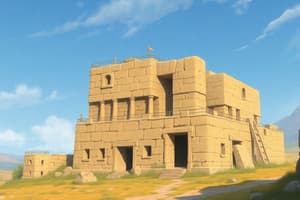Podcast
Questions and Answers
What defines a monolith in the context of religious monuments?
What defines a monolith in the context of religious monuments?
- A flat stone covering multiple upright stones.
- A structure made from tree barks and animal skins.
- An isolated single upright stone. (correct)
- A grouping of several stones.
Which term refers to earthen mounds used for burials?
Which term refers to earthen mounds used for burials?
- Dolmen
- Cromlech
- Tumuli (correct)
- Menhir
What is a characteristics of a dolmen?
What is a characteristics of a dolmen?
- An arrangement of stones placed upright in a line.
- Two or more upright stones supporting a horizontal slab. (correct)
- Three or more upright stones capped with a flat stone.
- A single upright stone.
What does a cromlech typically indicate?
What does a cromlech typically indicate?
Which of the following best describes a stone row?
Which of the following best describes a stone row?
What major cultural stage follows the Paleolithic period in the Stone Age?
What major cultural stage follows the Paleolithic period in the Stone Age?
Which construction principle is characterized by the use of vertical posts and horizontal beams?
Which construction principle is characterized by the use of vertical posts and horizontal beams?
What is NOT a factor influencing the development of architecture?
What is NOT a factor influencing the development of architecture?
Which of these is considered the earliest form of dwellings?
Which of these is considered the earliest form of dwellings?
During which period does the Bronze Age occur?
During which period does the Bronze Age occur?
Which of these is NOT a known type of early architecture?
Which of these is NOT a known type of early architecture?
Which of the following periods is marked by the advent of using metal for tools and structures?
Which of the following periods is marked by the advent of using metal for tools and structures?
Which architectural feature involves stacking horizontal stones, making it stable without vertical support?
Which architectural feature involves stacking horizontal stones, making it stable without vertical support?
Flashcards are hidden until you start studying
Study Notes
History of Architecture
- Architecture reflects human efforts to build aesthetically, showing growth and decline in styles over time.
- Influential factors in architectural design include geographical, geological, climatic, religious, social, political, and historical contexts.
Pre-Historic Architecture
- Development of prehistoric architecture is essential to understand the evolution of structures.
- Key objectives include studying various prehistoric structures and identifying surviving examples.
Cultural Stages of the Stone Age
- The Stone Age consists of three main periods:
- Paleolithic (Old Stone Age)
- Mesolithic (Middle Stone Age)
- Neolithic (New Stone Age)
Bronze and Iron Ages
- The Bronze Age spanned from 4000 to 3000 BC, while the Iron Age occurred around 25 to 50 years before Julius Caesar.
Dwellings in the Paleolithic Era
- Rock caves represent the earliest form of human dwellings, categorized into:
- Natural Caves: Formed by natural processes.
- Artificial Caves: Constructed by humans.
- Caves above the Ground: Elevated dwellings.
Construction Principles
- Early construction principles include:
- Post and Lintel (Trabeated) method.
- Arch and Vault construction techniques.
- Corbel and Cantilever structures.
- Trussed formations for stability.
Early Architecture Classifications
- Three primary classifications include:
- Dwellings
- Religious Monuments
- Burial Mounds
Religious Monuments
- Religious monuments are classified into:
- Monoliths (Menhirs): Single upright stones as memorials.
- Megaliths: Group of large stones, including:
- Dolmen: Two or more upright stones supporting a slab.
- Cromlech: Three or more upright stones with a flat stone on top for worship.
- Stone Rows: Arrangements of upright stones, exemplified by Stonehenge.
Burial Mounds
- Tumuli or Barrows: Earthen mounds used for burying groups of people, serving as precursors to Egyptian pyramids and beehive huts.
Studying That Suits You
Use AI to generate personalized quizzes and flashcards to suit your learning preferences.




